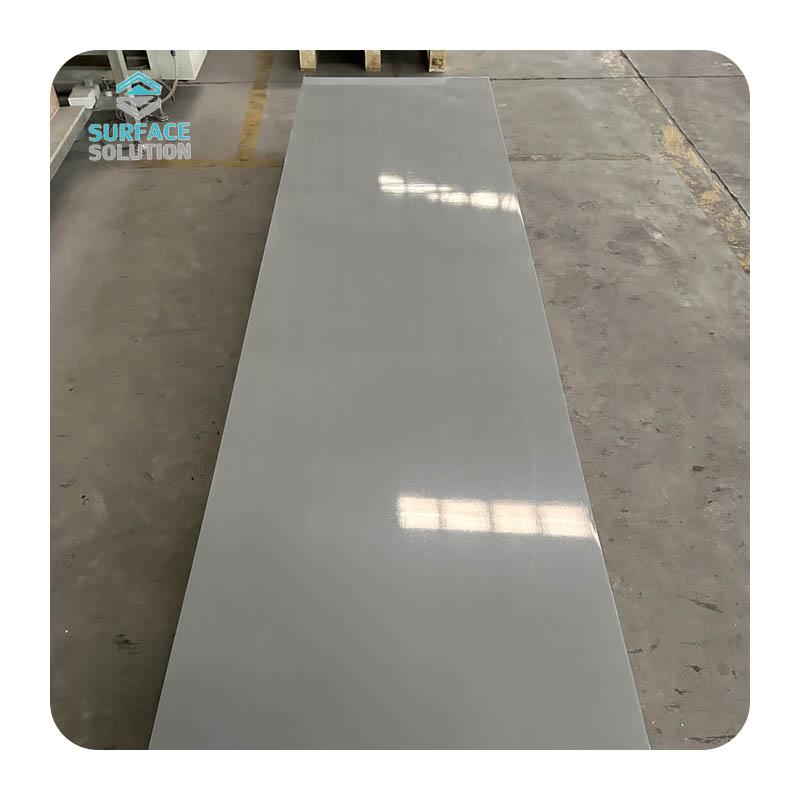

Before diving into comparisons, it’s important to define what makes a material a "solid surface" in this context. Unlike tile (which has grout lines) or paint (which is a thin coating), solid surface materials are dense, non-porous (or low-porous) sheets made from a homogeneous blend of resins, minerals, or natural materials. They are typically installed in large panels to minimize seams, reducing the risk of mold growth and simplifying cleaning. The best solid surfaces for showers share core traits: resistance to water penetration, mold, and staining; durability against scratches or impacts; and adaptability to different design styles.


Water Resistance: The material must repel water to prevent warping, rot, or mold. Non-porous options are best, as they don’t absorb moisture.
Durability: It should withstand daily use (e.g., splashes, cleaning products) without chipping, fading, or scratching.
Ease of Maintenance: Look for surfaces that require minimal upkeep—avoid materials that need regular sealing or special cleaners.
Seamlessness: Fewer seams mean fewer places for mold to hide. Some materials can be thermoformed or joined invisibly for a smooth look.
Aesthetics: The material should align with your bathroom’s style, whether modern, traditional, or rustic. Options range from matte to glossy, solid colors to stone-like patterns.
Cost: Budget varies, but it’s wise to invest in a material that will last 10–20 years (or longer) to avoid frequent replacements.
Pros: Fully non-porous (no mold risk), seamless installation (panels can be glued and sanded for invisible joints), scratch-resistant (minor scratches can be buffed out), and available in hundreds of colors/patterns. It’s also lightweight, making installation easier than stone.
Cons: Can be damaged by high heat (e.g., a hot hair tool left on the surface) and may fade if exposed to direct sunlight for years. It’s mid-range in cost (typically
100 per square foot installed).50–
Pros: Extremely durable (resistant to scratches, impacts, and heat), non-porous (no sealing required), and resistant to stains from products like shampoo or makeup. It mimics marble, granite, or concrete for a luxury look.
Cons: Heavy (requires sturdy wall support), which increases installation complexity and cost. Seams are visible (though less noticeable than tile), and it’s more expensive than acrylic (
150 per square foot installed). It can also chip if hit with a heavy object (e.g., a falling shampoo bottle), and chips are hard to repair.70–
Pros: Low cost (
60 per square foot installed), available in many patterns, and easy to clean. It’s also resistant to water if installed correctly.30–
Cons: Porous if the top layer is damaged (can absorb water and grow mold), seams are visible, and it’s prone to scratching or peeling over time. It has a shorter lifespan (5–10 years) compared to acrylic or quartz.
Pros: Unmatched aesthetic appeal—each slab is unique. Granite and slate are highly durable and water-resistant; marble adds elegance.
Cons: Porous (requires annual sealing to prevent staining and mold), heavy (needs reinforced walls), and expensive (
250 per square foot installed). Marble is especially soft and prone to etching from acidic products (e.g., vinegar, citrus-based cleaners). Repairs are difficult and often visible.100–
It checks every box for shower-specific needs: non-porous (no mold), seamless (easy to clean), durable (withstands daily use), and low-maintenance (no sealing required).
It’s versatile: Whether you want a sleek white shower, a bold color, or a subtle stone pattern, acrylic has options to match any design.
It offers great value: While it’s not the cheapest option, its 15–20 year lifespan and easy repairability (scratches buff out, small chips can be filled) make it a cost-effective long-term investment.
It avoids the pitfalls of other materials: Unlike quartz, it’s lightweight and has invisible seams; unlike laminate, it’s non-porous and long-lasting; unlike natural stone, it doesn’t need sealing or special care.
Quartz is a close second for those who prioritize heat resistance and a stone-like look (and have a larger budget). But for most people—especially those seeking a balance of performance, aesthetics, and affordability—acrylic solid surface is the clear winner.

Hire a professional installer: Seamless installation requires skill—poorly joined panels can leak or trap moisture.
Avoid harsh cleaners: Use mild soap and water or non-abrasive cleaners (skip bleach or ammonia, which can damage the surface).
Protect against heat: Never place hot objects directly on the walls (e.g., curling irons, hair dryers).
Address damage quickly: Buff out minor scratches with a fine-grit sandpaper, and repair small chips with acrylic filler (available at home improvement stores).
Related Blogs
-
 What Is The Best Solid Surface for Shower WallsWhen designing or renovating a bathroom, the choice of shower wall material is far more critical than many homeowners realize. Shower walls endure constant exposure to water, humidity, temperature fluctuations, and daily wear—making durability, water re
What Is The Best Solid Surface for Shower WallsWhen designing or renovating a bathroom, the choice of shower wall material is far more critical than many homeowners realize. Shower walls endure constant exposure to water, humidity, temperature fluctuations, and daily wear—making durability, water re -
 How To Clean Water Stains on Solid Surface CountertopsSolid surface countertops—made from materials like Corian, Staron, or Swanstone—are beloved for their durability, seamless design, and resistance to heat and scratches. However, they’re not immune to water stains, which can mar their smooth, slee
How To Clean Water Stains on Solid Surface CountertopsSolid surface countertops—made from materials like Corian, Staron, or Swanstone—are beloved for their durability, seamless design, and resistance to heat and scratches. However, they’re not immune to water stains, which can mar their smooth, slee -
 Combining Aesthetics and Durability: Solid Surface Stone TrendsPost-pandemic, homeowners are no longer choosing between beauty and resilience for home spaces—and solid surface stone, particularly acrylic variants, hits this sweet spot perfectly.Aesthetically, it’s keeping pace with 2025’s design shi
Combining Aesthetics and Durability: Solid Surface Stone TrendsPost-pandemic, homeowners are no longer choosing between beauty and resilience for home spaces—and solid surface stone, particularly acrylic variants, hits this sweet spot perfectly.Aesthetically, it’s keeping pace with 2025’s design shi
















